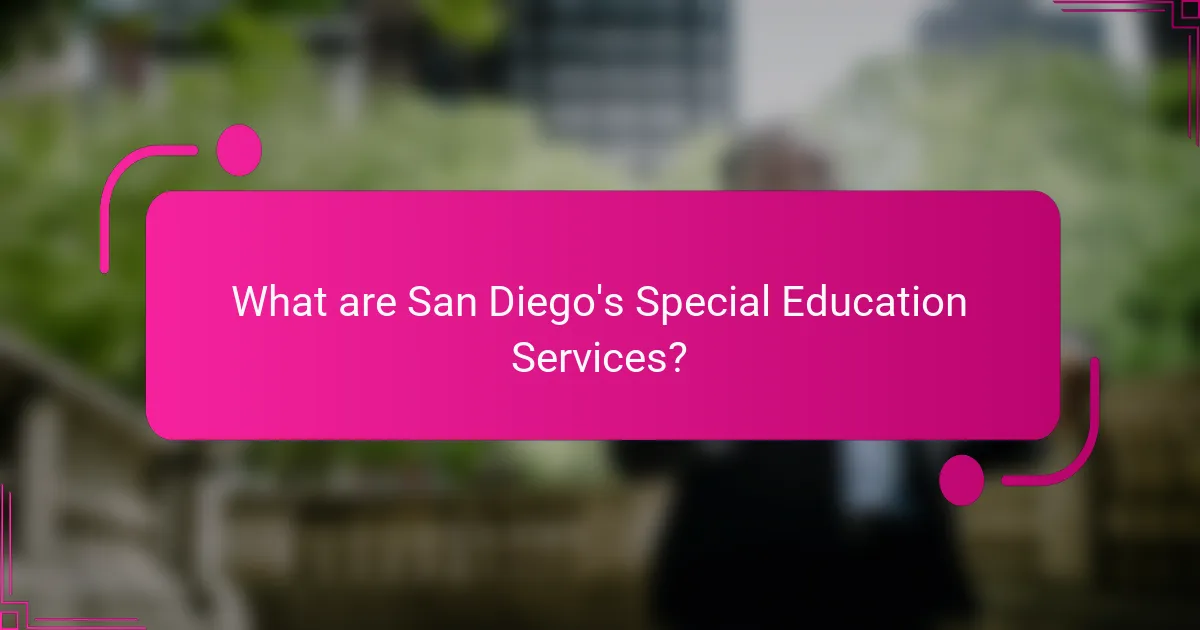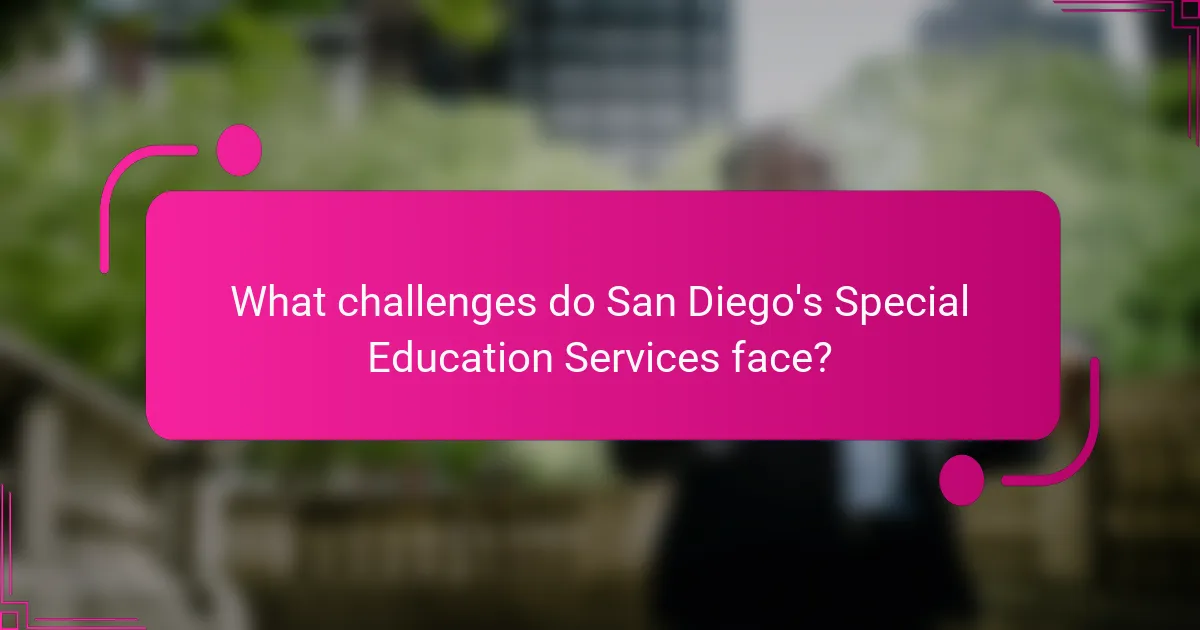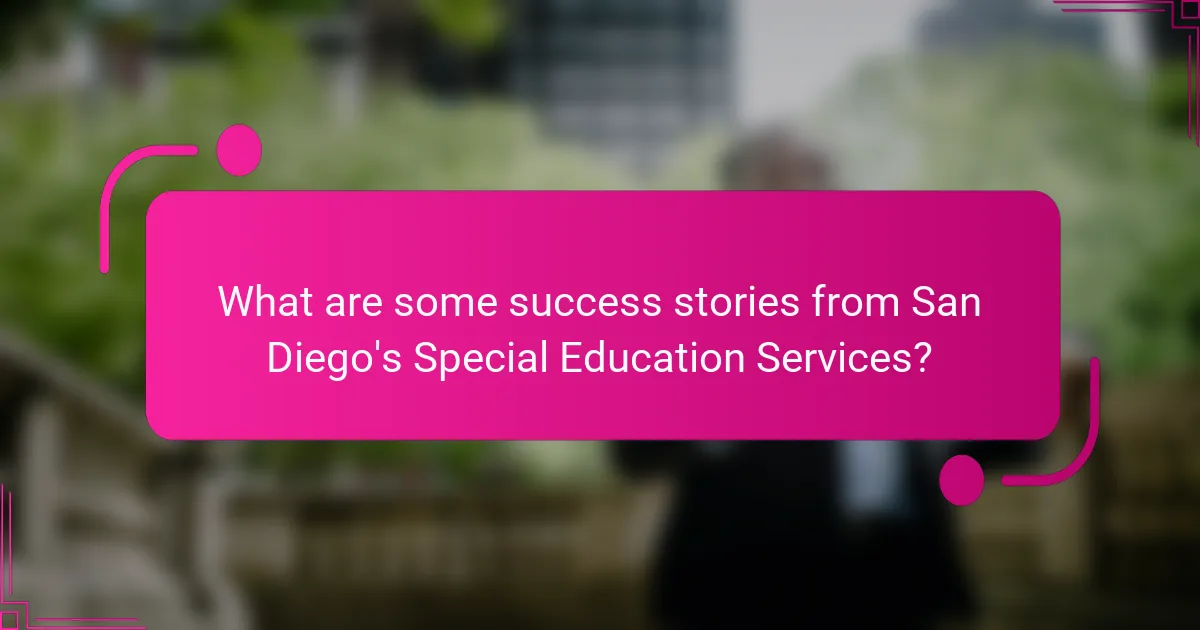
What are San Diego’s Special Education Services?
San Diego’s Special Education Services provide tailored support for students with disabilities. These services include individualized education programs (IEPs), specialized instruction, and related services such as speech therapy. The San Diego Unified School District oversees these programs, ensuring compliance with federal and state regulations. Each student receiving services has specific needs assessed through evaluations. The goal is to promote academic achievement and social development. Additionally, families are involved in the planning and decision-making processes. Resources are available to help educators implement effective teaching strategies. These services aim to foster an inclusive educational environment for all students.
How are these services structured within the education system?
Special education services in San Diego are structured through a collaborative model involving various stakeholders. The structure includes individualized education programs (IEPs) tailored to meet the needs of each student. Schools employ special education teachers, therapists, and support staff to implement these IEPs. Services are provided in inclusive settings whenever possible, promoting integration with general education peers. Additionally, families are actively involved in the decision-making process regarding their child’s education. The structure is governed by federal and state laws, ensuring compliance with regulations such as the Individuals with Disabilities Education Act (IDEA). According to the California Department of Education, over 10% of students in San Diego receive special education services, highlighting the importance of this structured approach.
What types of programs are included in San Diego’s special education services?
San Diego’s special education services include a variety of programs tailored to meet diverse needs. These programs encompass individualized education programs (IEPs), resource specialist programs, and special day classes. Additionally, there are programs for students with autism spectrum disorders and those requiring behavioral interventions. San Diego also offers inclusion programs that integrate special education students into general education settings. Transition services for students moving to adulthood are part of the offerings as well. These programs are designed to support academic, social, and emotional development for students with disabilities.
Who are the key stakeholders involved in these services?
Key stakeholders in San Diego’s special education services include parents, educators, school administrators, and support staff. Parents advocate for their children’s needs and participate in Individualized Education Program (IEP) meetings. Educators implement specialized teaching strategies to support students with disabilities. School administrators oversee the programs and ensure compliance with regulations. Support staff, including counselors and therapists, provide additional resources and services. These stakeholders collaborate to create an inclusive educational environment. Their involvement is essential for effective service delivery and improved student outcomes.
What is the purpose of special education services in San Diego?
The purpose of special education services in San Diego is to provide tailored educational support for students with disabilities. These services aim to ensure that students receive appropriate instruction based on their individual needs. They include specialized teaching methods, resources, and accommodations. The goal is to promote academic success and social development. Special education services also facilitate access to the general curriculum. They help students develop essential life skills. Furthermore, these services aim to support families in navigating educational challenges. In San Diego, special education services are guided by federal and state regulations.
How do these services address the needs of students with disabilities?
San Diego’s special education services address the needs of students with disabilities by providing tailored educational plans. These plans are designed to meet individual learning requirements. Services include specialized instruction, assistive technology, and support from trained professionals. Additionally, accommodations are made to create accessible learning environments. The services ensure compliance with the Individuals with Disabilities Education Act (IDEA). This federal law mandates appropriate educational opportunities for students with disabilities. Evidence shows that these services improve academic outcomes for affected students. Data from the California Department of Education indicates increased graduation rates among students receiving special education.
What are the legal frameworks supporting these services?
The legal frameworks supporting special education services in San Diego include federal and state laws. The Individuals with Disabilities Education Act (IDEA) mandates free appropriate public education for students with disabilities. Section 504 of the Rehabilitation Act prohibits discrimination against individuals with disabilities in programs receiving federal funds. California’s Education Code outlines specific provisions for special education services. These laws ensure that students receive necessary accommodations and support. They also establish guidelines for Individualized Education Programs (IEPs). Compliance with these frameworks is monitored by state and federal agencies. This legal structure is vital for protecting the rights of students with disabilities.

What challenges do San Diego’s Special Education Services face?
San Diego’s Special Education Services face significant challenges, including funding shortages and staffing issues. Funding for special education programs is often insufficient to meet the diverse needs of students. This leads to limitations in resources and support services. Staffing shortages affect the availability of qualified special education teachers and support staff. High turnover rates contribute to instability in service delivery. Additionally, the complexity of individual student needs requires tailored approaches, which can be difficult to implement consistently. Parent engagement and communication also present challenges, as families may feel disconnected from the services provided. These factors collectively hinder the effectiveness of special education services in San Diego.
What are the common obstacles in providing effective special education?
Common obstacles in providing effective special education include insufficient funding, lack of trained staff, and inadequate resources. Insufficient funding limits the availability of necessary programs and services. Many districts struggle to allocate enough money for specialized training and materials. The lack of trained staff results in a shortage of qualified educators who can address diverse needs. Inadequate resources hinder the implementation of individualized education plans (IEPs). Additionally, communication barriers between parents and educators can complicate the delivery of services. These challenges collectively impact the quality of education for students with disabilities.
How do funding issues impact the quality of services?
Funding issues significantly reduce the quality of services in special education. Insufficient funding leads to a lack of resources, including staff, materials, and training. This results in larger class sizes and less individual attention for students. Consequently, students may not receive the tailored support they need. A study by the Center for American Progress found that underfunded programs struggle to meet educational standards. Moreover, budget cuts often force schools to eliminate crucial support services. This negatively affects student outcomes and overall satisfaction with the education system. In San Diego, these funding challenges have led to ongoing debates about resource allocation and service quality.
What role does staff training play in overcoming challenges?
Staff training plays a crucial role in overcoming challenges within San Diego’s special education services. It equips staff with the necessary skills to address diverse student needs. Training enhances understanding of individualized education plans (IEPs) and effective teaching strategies. This knowledge fosters improved student engagement and learning outcomes. Furthermore, trained staff can better manage classroom behaviors and create inclusive environments. Research indicates that ongoing professional development leads to higher teacher efficacy. A study by the National Center for Learning Disabilities found that well-trained educators significantly impact student success rates. Thus, effective staff training is essential for navigating the complexities of special education.
How do families perceive the challenges within these services?
Families perceive challenges within San Diego’s special education services as significant and multifaceted. Many families report difficulties in accessing appropriate resources for their children. Communication barriers with educators often exacerbate these challenges. Parents frequently express frustration with the Individualized Education Program (IEP) process. They find it complex and time-consuming. Additionally, families often feel that their concerns are not adequately addressed. There is a perception of inconsistency in service delivery across different schools. Limited funding also poses a challenge, impacting the availability of specialized staff. These perceptions highlight the need for improved support and advocacy within the system.
What are the most significant concerns expressed by parents?
The most significant concerns expressed by parents regarding San Diego’s special education services include inadequate resources and support. Parents frequently report a lack of trained staff to address diverse needs. Many also highlight insufficient funding for specialized programs. Concerns about communication with educators are prevalent. Parents often feel uninformed about their child’s progress and available services. Another significant concern is the lengthy evaluation process for services. Delays in assessments can hinder timely support for children. Additionally, parents express worries about the transition from special education to mainstream schooling. This transition can be challenging without proper guidance and resources. Overall, these concerns reflect a need for improved support and communication within the special education system.
How does community support influence these challenges?
Community support significantly influences the challenges faced by San Diego’s special education services. It provides essential resources and advocacy for students with special needs. Support from local organizations can help bridge gaps in funding and services. Community involvement fosters awareness and understanding of special education issues. This can lead to increased engagement from families and stakeholders. Research indicates that strong community ties improve educational outcomes for students with disabilities. Collaborative efforts can enhance program effectiveness and resource allocation. Ultimately, community support plays a crucial role in overcoming obstacles in special education.

What are some success stories from San Diego’s Special Education Services?
San Diego’s Special Education Services have numerous success stories showcasing effective support for students. One notable example is the inclusion of students with autism in mainstream classrooms. This initiative has significantly improved social skills and academic performance. Another success story involves a student with learning disabilities who graduated high school with honors. This achievement was facilitated by tailored educational plans and dedicated support staff. Additionally, a program focused on vocational training has successfully placed students with disabilities in local jobs. These stories highlight the positive impact of specialized services on student outcomes in San Diego.
What innovative practices have emerged from successful programs?
Innovative practices from successful special education programs in San Diego include personalized learning plans and inclusive classroom settings. Personalized learning plans cater to individual student needs, enhancing engagement and academic achievement. Inclusive classrooms promote collaboration between students with disabilities and their peers, fostering social skills and empathy.
Additionally, the use of assistive technology has increased, allowing students to access the curriculum more effectively. Programs have also implemented family engagement strategies, which strengthen the support system for students. Data-driven decision-making is another practice that helps educators tailor interventions based on student performance metrics.
These innovative practices contribute to improved outcomes for students with disabilities, as evidenced by higher graduation rates and increased participation in general education settings.
How have specific schools improved outcomes for students?
Specific schools have improved outcomes for students through tailored educational programs. These programs address individual learning needs and promote inclusive practices. For instance, schools in San Diego have implemented specialized training for educators. This training equips teachers with strategies for supporting diverse learners. Data shows that students receiving these targeted interventions demonstrate higher academic performance. Additionally, increased parental involvement has been encouraged through workshops and resources. This engagement fosters a supportive learning environment and enhances student success. Schools also utilize data-driven assessments to monitor progress. This approach allows for timely adjustments to instructional strategies. Overall, these initiatives have led to measurable improvements in student outcomes.
What role do partnerships play in these success stories?
Partnerships are crucial in the success stories of San Diego’s special education services. They enhance resource sharing and collaboration among various stakeholders. Schools, families, and community organizations work together to create tailored support systems. This collaboration leads to improved educational outcomes for students with special needs. For instance, partnerships with local nonprofits provide additional funding and specialized training for educators. Data from the California Department of Education shows that collaborative programs significantly increase student engagement and achievement. These partnerships also foster a sense of community, ensuring that all voices are heard in the educational process. Overall, partnerships are a foundational element in driving success within San Diego’s special education framework.
How do success stories reflect the effectiveness of special education services?
Success stories illustrate the effectiveness of special education services by showcasing individual progress and achievement. These narratives highlight how tailored interventions meet diverse needs. For example, a student who improved academically due to specialized instruction demonstrates the impact of effective services. Additionally, success stories often include testimonials from families, emphasizing satisfaction with the support received. Research indicates that positive outcomes correlate with individualized education plans (IEPs) tailored to student strengths. Data shows that students in special education who receive appropriate services are more likely to achieve their goals. Thus, success stories serve as concrete evidence of the value of special education services in fostering growth and development.
What metrics are used to measure success in these programs?
Success in San Diego’s Special Education Services programs is measured using several key metrics. These metrics include student academic performance, which assesses improvements in standardized test scores. Another important metric is graduation rates, indicating the percentage of students who successfully complete their education. Additionally, attendance rates are monitored to evaluate student engagement and participation. Parent satisfaction surveys provide insights into the perceived effectiveness of the programs. Lastly, Individualized Education Program (IEP) goal achievement tracks the progress of students toward specific educational objectives. These metrics collectively provide a comprehensive view of program effectiveness and student outcomes.
How can these success stories inspire further improvements?
Success stories in San Diego’s special education services can inspire further improvements by showcasing effective strategies. They provide concrete examples of successful interventions and their positive outcomes. These examples can serve as models for best practices in other educational settings. Furthermore, success stories highlight the importance of collaboration among educators, families, and support staff. This collaboration can lead to more tailored approaches that meet individual student needs. Research indicates that sharing successful case studies can motivate stakeholders to adopt similar practices. Ultimately, these stories can drive continuous improvement in special education services across the district.
What practical tips can families use to navigate San Diego’s Special Education Services?
Families can navigate San Diego’s Special Education Services by understanding their rights and the available resources. They should familiarize themselves with the Individuals with Disabilities Education Act (IDEA). This federal law ensures students with disabilities receive appropriate education. Families can request an Individualized Education Program (IEP) meeting to discuss specific needs. Attending workshops and support groups can provide valuable insights. Utilizing the San Diego Unified School District’s website offers access to essential resources. Collaborating with teachers and specialists enhances communication and support. Documenting all communications helps track progress and concerns. Lastly, seeking advocacy services can assist in navigating complex processes.
San Diego’s Special Education Services provide tailored support for students with disabilities, including individualized education programs (IEPs), specialized instruction, and related services. The article covers the structure of these services, key stakeholders, and the legal frameworks supporting them, while also addressing challenges such as funding shortages and staffing issues. Additionally, it highlights success stories that demonstrate effective support and innovative practices within the programs. Families’ perceptions, common obstacles, and practical tips for navigating the system are also discussed, offering a comprehensive overview of the current state of special education services in San Diego.